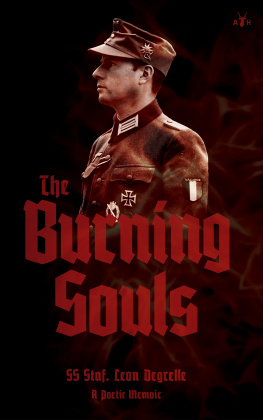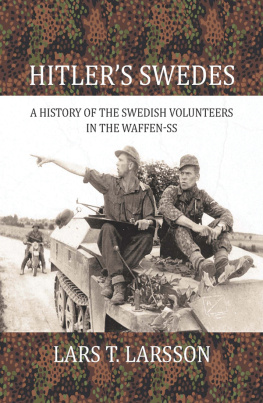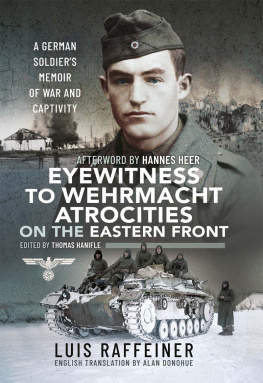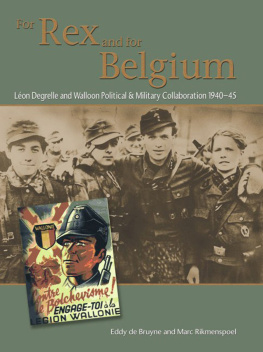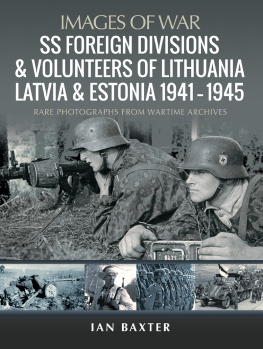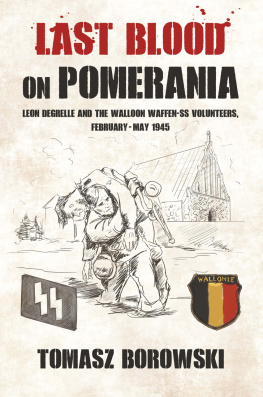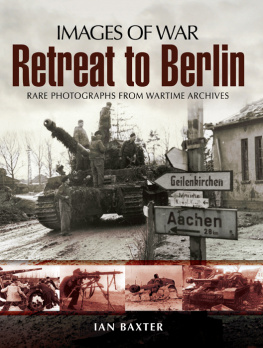L ES MES Q UI B RLENT
T HE B URNING S OULS
L ES MES Q UI B RLENT
T HE B URNING S OULS
also known as Militia
A poetic memoir of
L ON D EGRELLE
Translated by Rollo of Gaunt

Antelope Hill Publishing
Copyright 2020
Printing 2020
All rights reserved.
Translated by Rollo of Gaunt
Cover art by sswifty
The publisher can be contacted at
Antelopehillpublishing.com
T RANSLATORS N OTE
This edition of Lon Degrelles The Burning Souls is intended for the English reader, for whom there has thus far been no reliable translation of this particular work. This work has been a labor of love, and so while I am not the most qualified man to produce such a translation, I have faith that those more linguistically skilled than myself will forgive me for any errors, and if I inspire any of them to produce a better version, so much the better. The Burning Souls is half-prose, half-poetic, and as such, I have attempted throughout to preserve Degrelles meanings and intentions to the best of my ability, and also to preserve the impassioned quality with which he spoke and wrote throughout his lifetime. I hope only that I have done some justice to the authors depth of emotion.
May this man who found little rest in life find rest in what lies beyond, and may all men who grow weary and lose hope be inspired by his steadfast determination and unwavering courage in the face of great tragedy.
R OLLO OF G AUNT
C ONTENTS
P ART O NE:
E MPTY H EARTS
I The Flame and the Ashes
Here I am, nearly at the end of my life. I felt almost everything. Knew everything. More than anything, I suffered.
I saw, dazzled, the great golden fires of my youth arise. Their flames illuminated my land. The crowds made the starry waves of their thousands of faces dance around me. Their fervor, their eddies existed.
But did they really, in fact, exist? Wasn't all this a dream? Did I not dream that thirty years ago, a nation called my name, and that on certain days the most distant newspapers of the planet repeated it?
Tucked away in my exiled sadness, I can no longer believe in my past itself. Did I live those times or not? Know those passions? Raise those oceans? I walk my terraces. I lean over my roses. I discern the scents. Have I ever been another being, other than this lonely dreamer who vainly clutches at memories frayed like mountain fogs?
Wasn't all this something other than a hallucination?
I cannot see, far away, far away, in faded lights, their bodies, as if from a Greco painting, growing thinner and thinner. Did these men who have faded forever from the horizon know me? Did they follow me? Did I lead them? Did I exist?
In my memories, as in my hands, I no longer feel that fleeting wind. My eyes - and what eyes should I have, eyes of desperation? - my eyes may search the impassive sky, try to see in the depths of the years, in the depths of the century, what did it mean?
The being that I am, in what way is it still the being that once carried my name, who was known, who was listened to? For whom many have lived and for whom alas many have died? This being, what does it have to do with the man who walks, bitter, endlessly alone, upon a few meters of foreign land, rummaging through his past, losing himself in it, no longer believing in it, wondering if it is really he who was tossed a hundred times in the tornadoes of an implacable Destiny, or if this was no more than a dream?
So if I doubt my flesh, my bones, what my public action once forged, if I doubt the reality of my past and the part that I took in a few years of building up the history of men, what can I still believe of the ideals which were born in me, which burned me, which I projected, of the value of my convictions at the time, of my feelings, of what I thought of humanity, what I dreamed of creating for her?
Each human being is a succession of human beings, as dissimilar from each other as the passers-by whose disparate faces we scrutinize in the street.
At fifty, how do we still look like the young man of twenty whom we are trying to remember and whose survival we want at all costs? Even his flesh is no longer the same flesh, it is gone, has been remade, renewed. No more than a millimeter of skin is the skin of those times.
What then about the soul? And our thoughts? The feelings that propelled us to action? And the feelings that passed to us, like breaths of fire through the heart?
How many distinct men do we carry within us, who fight, who contradict each other, or who even ignore each other? We are good and we are evil, we are the abjection and the dream. We are both, tangled in inextricable nets. But it is not here that the horror of fate lies. The atrocious thing is to break these nets themselves, to throw your soul overboard; the horrible thing is to have to say that the essential in our lives was caricatured, disfigured by a thousand defilements and a thousand denials.
Who has not experienced these debacles?
Some realize their bankruptcy with pain. Others make the observation with cynicism, or with the arrogant smile of those who no longer listen, who are convinced that the knowledge of man and the superiority of the spirit consist in engaging in all experiences, deliberately exhausting the most perverse pleasures, without excessive astonishment and without regret, having found, in the use and in the desecration of everything, information, the condescension and indifference of an ethics of decomposition, free from any spiritual counterbalance.
Without a doubt, the world in which we live has become, to a great extent, the world of these amoral people, so sure of themselves. No doubt, those who would persist in imagining a humanity of high virtues may fancy them to be anachronistic beings, non-evolved, glued to old fads, living apart from men, apart from their time, apart from fashion, apart from reality.
It was here that I arrived. I had dreamed of a century of Knights, strong and noble, all-dominating. Hard and pure, my banners said. I feel unbalanced, with my bundle of old dreams. I know that feelings like the ones I have tried to express can hardly be felt anymore, or even seem painful to some.
But I have seen so much, I have suffered so much that one more bitter thought will not tire me beyond my ability . So, too bad! These dreams, well yes, I had them. These impulses, yes, I carried them. This love of others, yes, it burned me, it consumed me. I wanted to see in man a heart to love, to excite, to raise, a soul which, even if it was half-asphyxiated by the pestilence of its slavery, aspired to find a pure breath and sometimes only waited for a word, or a look, to emerge and to be reborn.
Let us be straightforward. The right to interject, to use others, the right to moral or spiritual consideration, these I do not have. I know this only too well. I have had my share of miseries, alas, like so many others; and even if I hadnt suffered them myself, Ive been loaned so many miseries from others that I can only feel, when I analyze myself, confusion and unfathomable sadness. Yet the spirit of the ideal that throws its fire into this book has devoured me every day of my existence. I should, of course, have left it to others, less affected, the care and responsibility of returning light and song to mankind. But that fire was burning me down. Today, suffocated by a relentless spell, the great fire of yesteryear leaves nothing but ashes. I come back to it anyway, stubbornly, because these ashes evoke the moments of fervor in my life, the deepest impulses, the very spiritual basis of my action. Here they are, disarrayed, delivered to the wind which will quickly disperse them.
Next page
